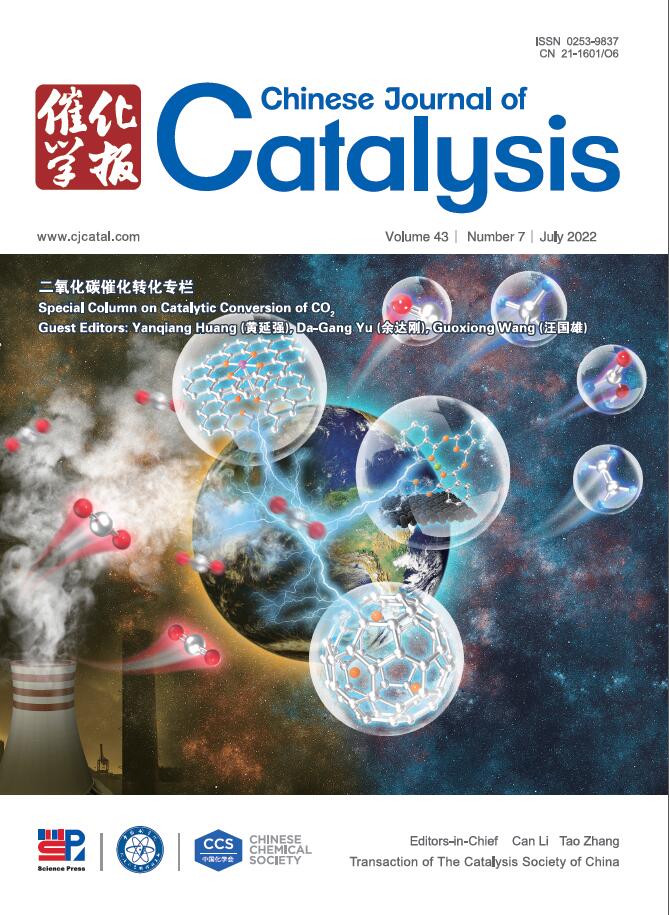掺镁 SrTaO2N 作为可见光驱动的 H2 演变光催化剂,用于加速 Z 型整体水分离
IF 15.7
1区 化学
Q1 CHEMISTRY, APPLIED
引用次数: 0
摘要
透辉石 SrTaO2N 是最有前途的 Z 型整体水分离窄带隙光催化剂之一。然而,热氮化过程中缺陷态的形成严重阻碍了电荷的分离,导致光催化活性较差。在本研究中,我们通过通量辅助一锅氮化结合掺杂镁,成功合成了缺陷态密度低、形貌和粒度均匀的 SrTaO2N 光催化剂。单胞尺寸、氮含量和微观结构等一些重要参数证明了掺镁的成功。掺入镁后,与缺陷有关的载流子重组显著减少,从而有效地促进了电荷分离。此外,掺杂镁还会引起带边的变化,从而使质子还原具有更强的驱动力。在与核/壳结构的 Pt/Cr2O3 催化剂修饰后,优化的 SrTaO2N:Mg 的 H2 演化活性是未掺杂 SrTaO2N 的 10 倍,在 420 纳米波长下的表观量子产率高达 1.51%。以 Au-FeCoOx 修饰的 BiVO4 作为 O2 演化光催化剂,以[Fe(CN)6]3-/[Fe(CN)6]4- 作为氧化还原偶联剂,成功构建了基于氧化还原的 Z 型整体水分离体系,420 纳米波长下的表观量子产率为 1.36%。这项工作为制备缺陷减少的氮氧化物半导体以促进太阳能转换提供了另一种途径。本文章由计算机程序翻译,如有差异,请以英文原文为准。
Mg-doped SrTaO2N as a visible-light-driven H2-evolution photocatalyst for accelerated Z-scheme overall water splitting
Perovskite SrTaO2N is one of the most promising narrow-bandgap photocatalysts for Z-scheme overall water splitting. However, the formation of defect states during thermal nitridation severely hinders the separation of charges, resulting in poor photocatalytic activity. In the present study, we successfully synthesize SrTaO2N photocatalyst with low density of defect states, uniform morphology and particle size by flux-assisted one-pot nitridation combined with Mg doping. Some important parameters, such as the size of unit cell, the content of nitrogen, and microstructure, prove the successful doping of Mg. The defect-related carrier recombination has been significantly reduced by Mg doping, which effectively promotes the charge separation. Moreover, Mg doping induces a change of the band edge, which makes proton reduction have a stronger driving force. After modifying with the core/shell-structured Pt/Cr2O3 cocatalyst, the H2 evolution activity of the optimized SrTaO2N:Mg is 10 times that of the undoped SrTaO2N, with an impressive apparent quantum yield of 1.51% at 420 nm. By coupling with Au-FeCoOx modified BiVO4 as an O2-evolution photocatalyst and [Fe(CN)6]3−/[Fe(CN)6]4− as the redox couple, a redox-based Z-scheme overall water splitting system is successfully constructed with an apparent quantum yield of 1.36% at 420 nm. This work provides an alternative way to prepare oxynitride semiconductors with reduced defects to promote the conversion of solar energy.
求助全文
通过发布文献求助,成功后即可免费获取论文全文。
去求助
来源期刊

Chinese Journal of Catalysis
工程技术-工程:化工
CiteScore
25.80
自引率
10.30%
发文量
235
审稿时长
1.2 months
期刊介绍:
The journal covers a broad scope, encompassing new trends in catalysis for applications in energy production, environmental protection, and the preparation of materials, petroleum chemicals, and fine chemicals. It explores the scientific foundation for preparing and activating catalysts of commercial interest, emphasizing representative models.The focus includes spectroscopic methods for structural characterization, especially in situ techniques, as well as new theoretical methods with practical impact in catalysis and catalytic reactions.The journal delves into the relationship between homogeneous and heterogeneous catalysis and includes theoretical studies on the structure and reactivity of catalysts.Additionally, contributions on photocatalysis, biocatalysis, surface science, and catalysis-related chemical kinetics are welcomed.
 求助内容:
求助内容: 应助结果提醒方式:
应助结果提醒方式:


